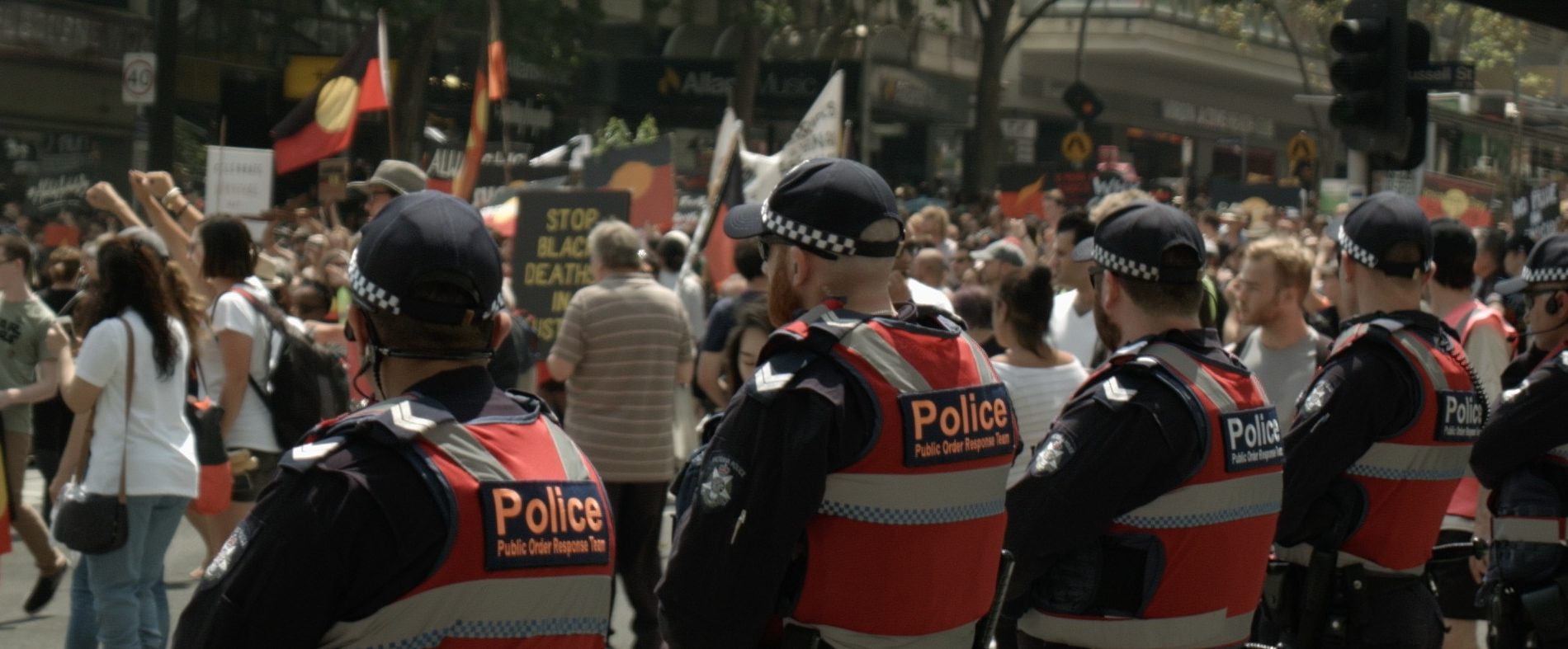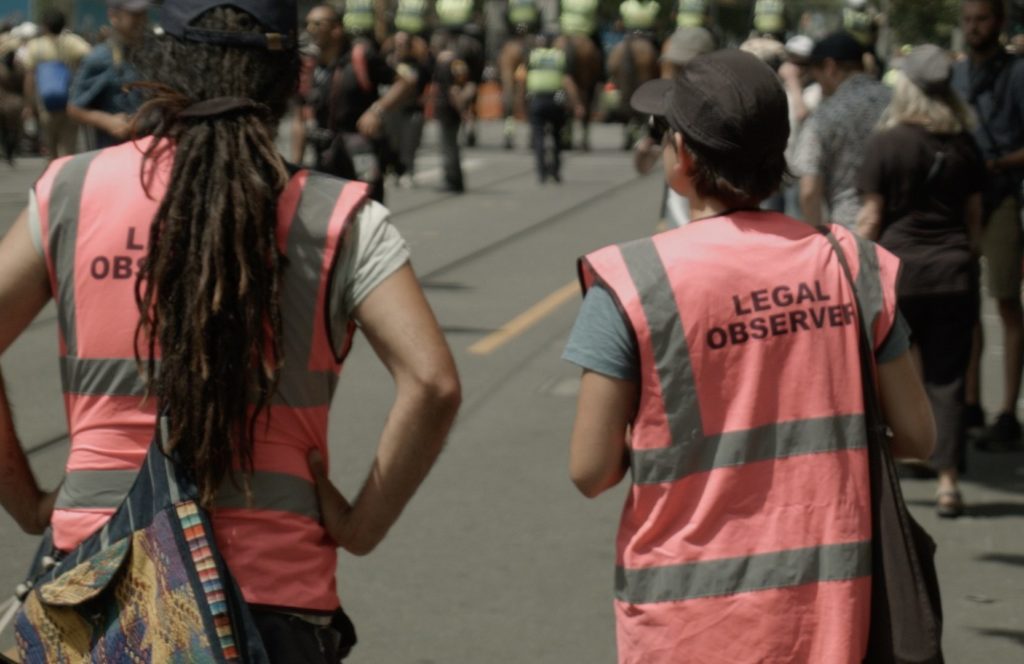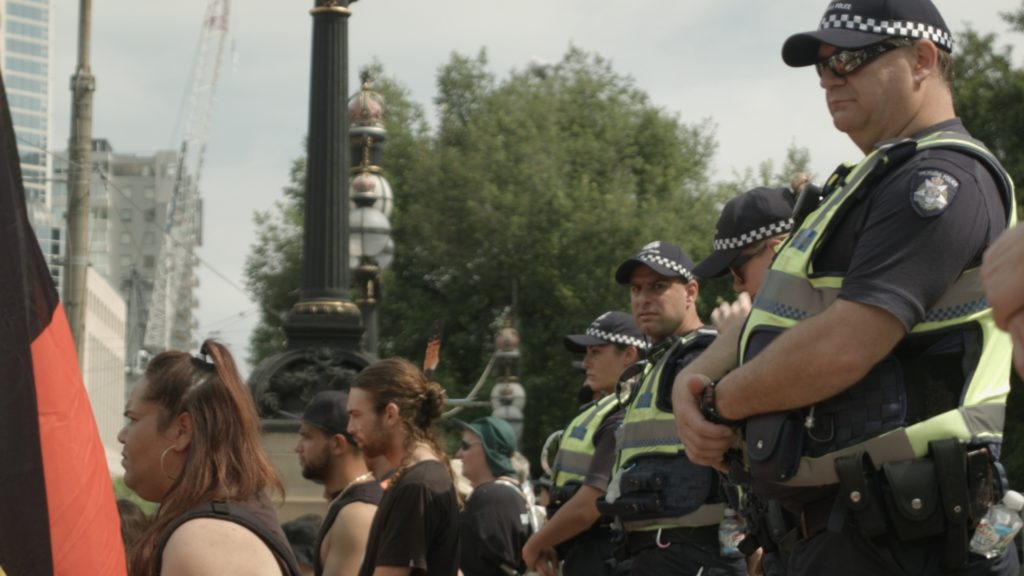Event Report: Invasion Day Rally, March 2018

Melbourne Activist Legal Support (MALS) fielded a team of seven(7) legal observers at the 2018 Invasion Day Rally and March which was organised by the Warriors of Aboriginal Resistance (WAR).
The team observed and noted police behavior, crowd control tactics and interactions with the public from 9.30am until the completion of the event at 3.30pm.
Police presence was significantly larger than for previous Invasion Day protest marches in recent years but moderate given the large estimated crowd size which ranged between 40,000 – 60,000 attendees.
As MALS has discussed previously, protests by or about indigenous rights, black deaths in custody or land rights in Australia have historically attracted a more interventionist and controlling level of policing than an equivalently sized non-indigenous protest. MALS has observed this over the past few years where peaceful, well organized and even solemn events such as the Invasion Day rallies are heavily policed despite there clearly being no plans for disruptive or violent action.
Police conduct during the 2018 march through the Melbourne CBD primarily appeared to be generally facilitative and designed to manage the movement of the marchers west down Bourke St, to turn south down Swanston Street and then eventually east down Flinders Street to the march endpoint at Parliament Gardens. Some Public Order Response Team (PORT) cordons were positions across streets at various locations designed to prevent the march interacting with the City of Melbourne Australia Day Parade down Swanston St. This meant that the march was delayed for short periods of time whilst organisers liaised with police and saw the eventual moving of police cordons.
Police cordons during similar protest events in the CBD can infringe upon the rights of peaceful assembly and association contained in section 16 of the Victorian Charter Of Human Rights and Responsibilities Act (2006). The team present on this day considered the limitation in this instance to be temporary, particularly considering the length of time the marchers chose to remain at various intersections along the route which were unhindered by police action.
The Australia Day Parade was completed by the time the march arrived at Swanston Street but metal barricades along both sides of the road posed some problems due to the large crowd size.
MALS was also noted that police were cognizant of the risk that right-wing groups or individuals would make attempts to counter-protest or harass the rally. The team noted one incident on Flinders Street where a right wing activist was prevented from gaining access to the protest by police.
We note from the Street Medic team present that only minor heat related injuries were treated.
Areas of Concern

The Victoria Police Mounted Branch (9 horses and mounted police) was present and maintained a position approximately 50 metres in front of the protest march for most of the time. The presence of police horses in crowd situations poses a significant risk of injury given the size of the crowd, the presence of children, prams and the inability of people to get out of their way if they are maneuvered close to crowds. Although they were not utilised to control crowds at this event, their presence remains unnecessarily intimidating and MALS strongly recommends that police horses not be deployed in any crowded or populated area at any protest event due to risk of severe injury.
Use of Force
Legal Observers witnessed and received some reports of use of force by police members in the Public Order Response Team (PORT) as the attendees rallied at the Flinders St station intersection.
One attendee reported that her female friend and an elderly male were pushed back by an police member as they tried to move further down St Kilda Rd/Swanston St when the march initially arrived at the intersection. The attendee reported that the officer was unprovoked and had not issued any verbal instructions or warnings beforehand.
A MALS Legal Observer was also subject to physical force (a rough push) by a PORT member upon arrival at the Flinders St intersection. The legal observer subsequently brought this to the attention of the officer in charge.
Identification
MALS also notes with some concern that many PORT members were not wearing their official ID badge, despite requirements to do so. Notably, the PORT member who pushed the MALS legal observer did not have their ID badge.
By their own regulations, VicPol members in uniform are required to wear current issue name tags that specify first name or initial/s, surname and rank. (Victoria Police Manual, Uniform and Appearance Standards, Oct 2016)

As we have noted numerous times previously, the wearing of visible name tags at protest events is inconsistent and this poses serious problems for accountability.
Media and online harassment of activist
We also note with concern that some sections of the media choose to single out and highlight one provocative statement from the rally and even made it into a headline in some cases.
Legal Observers heard the statement in its context and it was clearly a metaphorical and figurative point as was later explained by the organiser herself. Singling out this one statement amidst an half day of speeches is no more than racist demonisation. It has served to generate outrage and condemnation from parties who were not present and has resulted in online abuse, threats and harassment of the organiser.
The abuse or harassment of an activist in any online forums is unacceptable. Resources to deal with this sort of online harassment are available here and here.
This is the fourth year in a row that MALS has provided support to attendees at the Invasion Day Rally.
This Statement is a public document and is provided to media, Victoria Police Professional Standards Command, the Victorian Equal Opportunity and Human Rights Commission (VEOHRC), and other agencies upon request.
For inquiries please contact us.